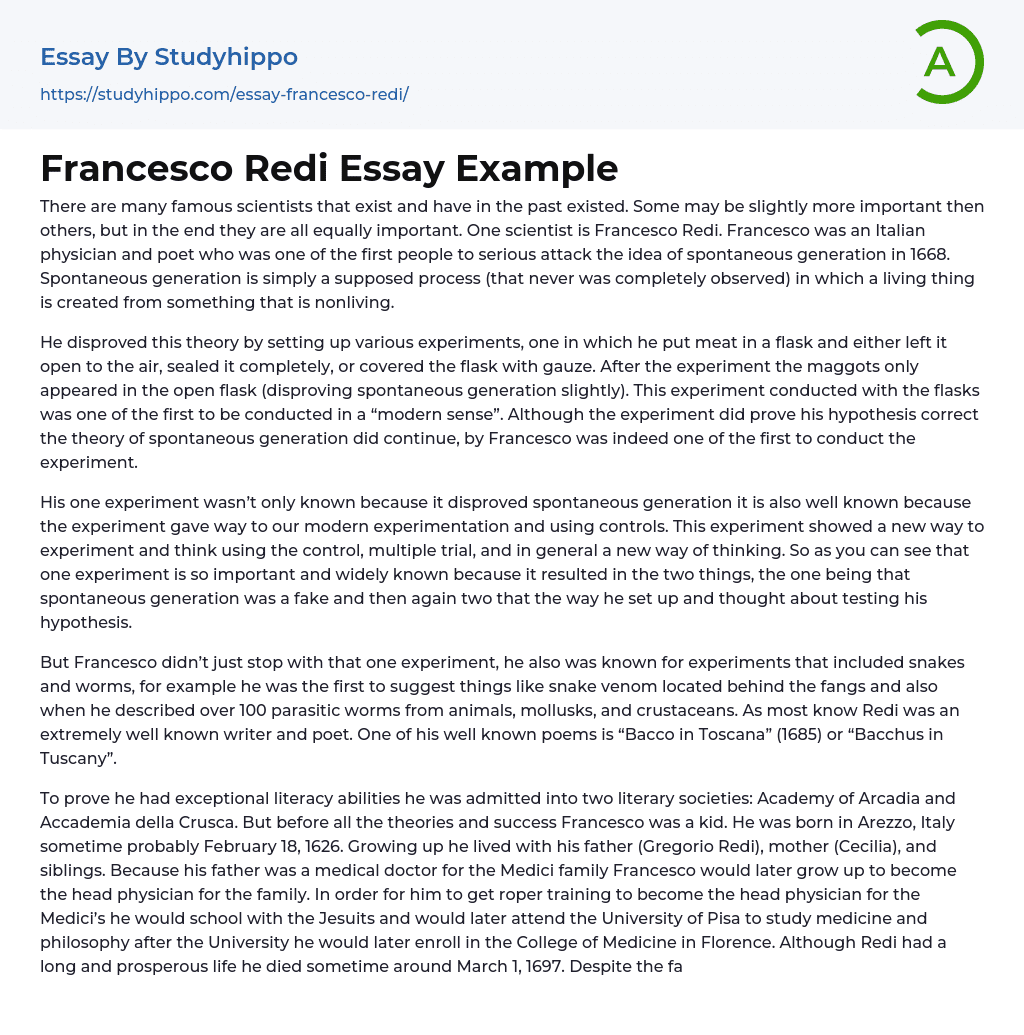Many esteemed scientists have left a lasting impression throughout history and continue to make remarkable contributions. While some may appear more influential, each makes substantial contributions in their distinct way. A prime example is Francesco Redi from Italy. Besides his roles as a doctor and poet, he is celebrated as one of the trailblazers who rigorously contested the spontaneous generation concept in 1668. Spontaneous generation is an unsupported theory that proposes life can emerge from non-living materials.
Through various experimental procedures, he provided contradictory findings to the existing theory. A notable experiment consisted of leaving meat in a flask under varying circumstances; in contact with air, fully sealed and covered with gauze. Only when the flask was left open did maggots manifest, thus providing some proof against spontaneous generation. This test is considered an initial stride towards a "modern sense" experimenta
...l methodology. Even though these results backed his hypothesis, the concept of spontaneous generation still dominated. Nonetheless, Francesco emerged as a pioneer in conducting such experiments.
The distinctive experiment he performed played a pivotal role in dispelling the myth of spontaneous generation, while also laying the groundwork for current experimental methods incorporating controls. This approach initiated a fresh epoch of scientific investigation by proposing notions such as control variables, repeated experiments, and ground-breaking thought patterns. Consequently, this experiment is greatly esteemed primarily due to two factors: it overturned the mistaken belief in spontaneous generation; furthermore, it brought forth a novel technique to create and evaluate hypotheses.
Francesco's experimental explorations weren't limited to just one. He was recognized for his endeavors in studying snakes and worms. He notably suggested that snak
venom is situated behind the fangs and catalogued over a hundred types of parasitic worms seen in animals, mollusks, and crustaceans. Apart from being a premier experimenter, Redi enjoyed substantial fame as a poet and author. His notable poem “Bacco in Toscana” (1685) also known as “Bacchus in Tuscany” showcases his literary talents.
Born in Arezzo, Italy around February 18, 1626, Francesco Redi was a humble child who went on to earn recognition for his impressive literary prowess. He had the distinction of becoming a member of two prestigious literary societies - the Academy of Arcadia and Accademia della Crusca. His upbringing played a significant role in shaping his career choice; he was raised by his father Gregorio Redi, personal physician to the eminent Medici family, and his mother Cecilia along with other siblings. This familial backdrop significantly influenced Francesco's decision to become the chief doctor for this influential clan later in life. To realize this ambition, he embarked on an extensive educational journey beginning with a Jesuit school followed by advanced studies in medicine and philosophy at the University of Pisa before enrolling at Florence College of Medicine. Despite living an extraordinary life which ended around March 1, 1697, and making pioneering contributions that revolutionized scientific research methodology; Redi received relatively minimal recognition for his phenomenal accomplishments.
Indeed, a Martian crater now bears his name, and his legacy also lives on through an award named the Redi Prize, the International Society on Toxinology's top honor for exceptional achievements in this area. Consequently, without this single figure, the progress of our science could either be greatly stalled or altogether different. It is clear
that an individual has left a lasting impact when their triumphs persist into the present day and age. Owing to Francesco Redi, we made significant strides towards negating spontaneous generation and towards developing superior experiment testing methods.
- Animals essays
- Charles Darwin essays
- Agriculture essays
- Archaeology essays
- Moon essays
- Space Exploration essays
- Sun essays
- Universe essays
- Birds essays
- Horse essays
- Bear essays
- Butterfly essays
- Cat essays
- Dolphin essays
- Monkey essays
- Tiger essays
- Whale essays
- Lion essays
- Elephant essays
- Mythology essays
- Time Travel essays
- Discovery essays
- Thomas Edison essays
- Linguistics essays
- Journal essays
- Chemistry essays
- Biology essays
- Physics essays
- Seismology essays
- Reaction Rate essays
- Roman Numerals essays
- Scientific Method essays
- Mineralogy essays
- Plate Tectonics essays
- Logic essays
- Genetics essays
- Albert einstein essays
- Stars essays
- Venus essays
- Mars essays
- Evolution essays
- Human Evolution essays
- Noam Chomsky essays
- Methodology essays
- Eli Whitney essays
- Fish essays
- Dinosaur essays
- Isaac Newton essays
- Progress essays
- Scientist essays




